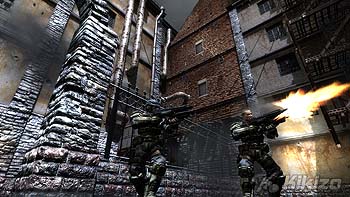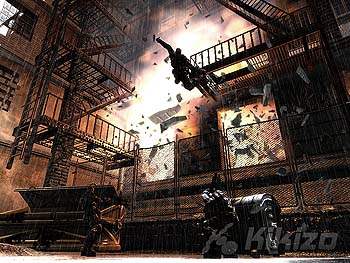A Sense of Time: TimeShift Interview
Control time while bringing down a fascist regime. We chat with Sierra's Kyle Peschel about the hot console and PC shooter.
Page: 1 2
Page 2
Say you're running out of ammunition. You can stop time, run up to an enemy, grab the gun out of his hands, and then restart time. Startled, the enemy will look down at his hands, giving you a pleading look. But he'll quickly try to grab another gun, so don't waste your chance. It's just one example of how the artificial intelligence in the game is fully adaptive, reacting in real-time to your actions.
It's also important to take in just how the time controls are working in the game world. "You would see me move like Dash from the Incredibles," Peschel says to describe how you move when time is slowed. "I would take a single-fire gun and make it look like it's a ... machine gun, because I can fire so much faster than you."
The world reacts differently when it's been temporally altered too. Water, for instance, becomes solid enough to walk on when you stop time - not because it's no longer liquid but because when you stop time you're essentially moving from place to place instantaneously as far as the world is concerned.
Often during our visit, Peschel pauses long enough to point out the subtle details that bring the world to life, whether it's the individual rain drops that scatter light realistically, the grain in the wood around us or pores in the steel walls. The environment isn't merely a backdrop for TimeShift, it's an integral element in creating the oppressive atmosphere that permeates the downtrodden world.
The technology behind the impressive visuals is all in-house. Peschel and his team steered clear of Unreal Engine 3.0, Epic's software middleware tool so relied on by developers in an age of seven-figure budgets. The team also did motion capturing throughout, to get all those nuances that make character movement that much more believeable.
As great as it all looks, its real beauty is in its interactivity. The world around you is completely destructible, and unlike so many other games that make similar promises, the effects of your actions are persistent.
"Why is it that when I play first-person shooters, I've been conditioned to think that I can carry a rocket launcher, but a little glass - ooh, don't go there," says Peschel. You'll be able to shoot pipes to let our steam, smash through glass to get to new locations - basically interact with the world in a genuine way.
This same attention to detail and time-controlling detail would be hard to bring to multiplayer. But hard is not impossible. "We came up with a way," Peschel says. That way is to make the time effect more local by tying them to variously abled grenades. These let you stop, slow or reverse time in bubbles of space in the world.
TimeShift, Peschel says, "is about the constant balance all the time, giving users something that they don't expect and then expanding upon on it endlessly."
It's about time.
TimeShift will be out for PC, Xbox 360 and PlayStation 3 this October. Find out more at www.timeshiftgame.com.
![]()
Page: 1 2











 Satoru Iwata Video Interview - the late Nintendo president spoke with Kikizo in 2004 as 'Nintendo Revolution' loomed.
Satoru Iwata Video Interview - the late Nintendo president spoke with Kikizo in 2004 as 'Nintendo Revolution' loomed. Kaz Hirai Video Interview - the first of Kikizo's interviews with the man who went on to become global head of Sony.
Kaz Hirai Video Interview - the first of Kikizo's interviews with the man who went on to become global head of Sony. Ed Fries Video Interview - one of Xbox's founders discusses an epic journey from Excel to Xbox.
Ed Fries Video Interview - one of Xbox's founders discusses an epic journey from Excel to Xbox. Yu Suzuki, the Kikizo Interview - we spend time with one of gaming's most revered creators.
Yu Suzuki, the Kikizo Interview - we spend time with one of gaming's most revered creators. Tetris - The Making of an Icon: Alexey Pajitnov and Henk Rogers reveal the fascinating story behind Tetris
Tetris - The Making of an Icon: Alexey Pajitnov and Henk Rogers reveal the fascinating story behind Tetris Rare founders, Chris and Tim Stamper - their only interview? Genuinely 'rare' sit down with founders of the legendary studio.
Rare founders, Chris and Tim Stamper - their only interview? Genuinely 'rare' sit down with founders of the legendary studio. The History of First-Person Shooters - a retrospective, from Maze War to Modern Warfare
The History of First-Person Shooters - a retrospective, from Maze War to Modern Warfare